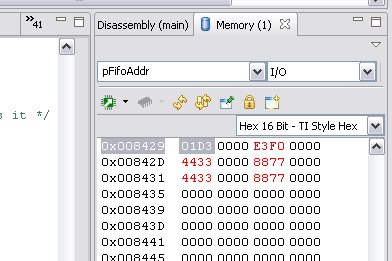Hi,
It seams as no matter how I setup and call USB_postTransaction in the csl_usb_intc_example. I never get the data in "usbDataBuffer" buffer that I'm sending from the host. In the FIFO i can see some of the data when breaking right after USB_postTransaction (when looking at "pFifoAddr" in the "USB_handleRx" function in the "csl_usbAux.h" file), but I never get anything in the "usbDataBuffer". I get this in the FIFO when I sent 0x1122334455667788 from the host:

It looks like I get the "4433" and the "8877" in the FIFO somehow but never gets to the usbDataBuffer (unless I modify "USB_handleRx" function to read from *(pFifoAddr+5) for example, which seams very wrong).
Looking at an older post, it seems like it should be at least be possible to receive data from the OUT point (not considering sending back to the host through IN point): http://e2e.ti.com/support/dsp/tms320c5000_power-efficient_dsps/f/109/p/50007/178421.aspx#178421
I know I probably shouldn't use the example since it meant for looping the buffer back to the host, but I just want to make rapid prototyping since I'm only one person working on the platform right now.
Thanks,
Stefan

